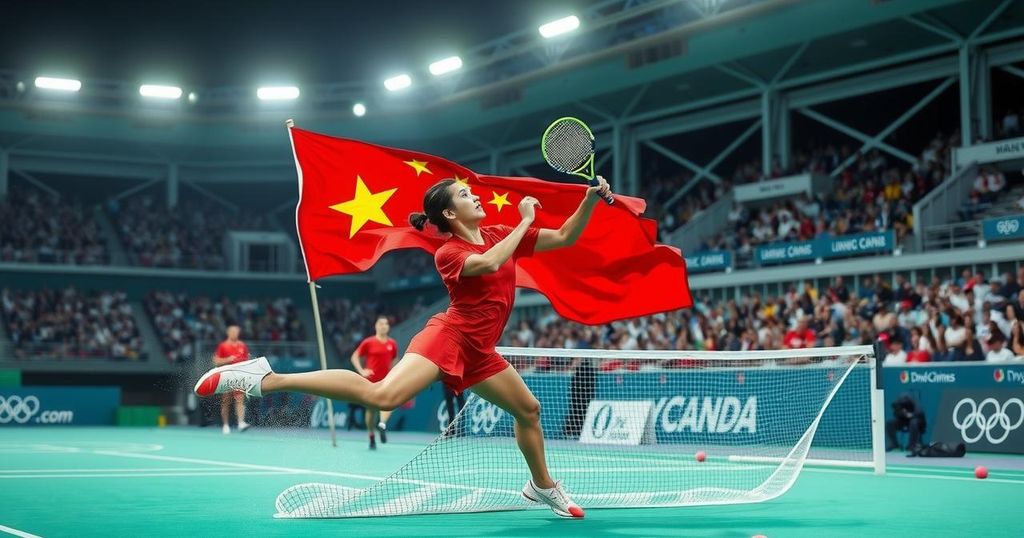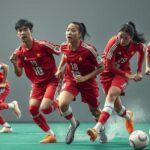China’s Olympic Triumphs and Challenges in Major Ball Sports in 2024
In 2024, China achieved a remarkable 91 medals at the Paris Olympics, its best performance abroad, while also facing challenges in soccer, basketball, and volleyball. The year witnessed significant successes in various sports, particularly with young athletes emerging. Reform efforts led by the General Administration of Sport aim to revitalize these ball sports, marking a pivotal year for Chinese athletics.
The year 2024 has proven to be monumental for Chinese sports, particularly during the Paris Olympics where the nation secured an unprecedented total of 91 medals, encompassing 40 gold, 27 silver, and 24 bronze. This remarkable achievement marks China’s best performance at an international Olympic event. However, significant challenges remain in the realm of traditional ball sports, namely soccer, basketball, and volleyball, which necessitate ongoing reform and strategic development efforts.
The General Administration of Sport (GAS) of China has reported that Chinese athletes not only attained 194 world championship titles across 33 sports—setting a record for the most titles won by the nation—but also established 19 new world records. Among the medal winners were 84 Olympic champions, showcasing China’s strengths in long-established sports like table tennis and diving, which witnessed a full sweep of gold medals. Moreover, the emergence of young athletes like Pan Zhanle, who shattered the world record in the men’s 100-meter freestyle, signifies a promising future for Chinese sports on a broader scale.
The enthusiasm surrounding sports in China has surged following the Olympic successes, particularly in tennis, which has gained a following due to Zheng Qinwen’s gold medal victory. Major national tournaments have seen heightened attendance, with the World Table Tennis event in Beijing attracting hordes of fans. This excitement has extended into winter sports, as athletes prepare for the upcoming Asian Winter Games, indicating a thriving sports culture that connects grassroots activities with elite competitions.
Nevertheless, the main ball sports continue to face significant hurdles. The men’s football team has displayed inconsistency, while the men’s basketball team has unfortunately failed to qualify for the Olympics for the second time consecutively. Addressing these challenges is critical; thus, the GAS has initiated the National Youth Games for Football, Basketball, and Volleyball to cultivate and nurture the next generation of athletes. Gao Zhidan, the head of GAS, emphasized the necessity of transforming these sports not only for athletic success but for enhancing China’s international standing.
In summary, 2024 has been a transformative year for Chinese sports, with impressive achievements overshadowed by ongoing difficulties in core ball sports. Champions have risen across multiple disciplines, indicating a solid foundation for future success. However, sustained reform efforts will be crucial to ensuring growth and excellence in soccer, basketball, and volleyball going forward.
As China made a significant mark in the Paris 2024 Olympics with a record number of medals, including historic victories in various less-dominant sports, the country simultaneously faced critical challenges in its major ball sports sector. The General Administration of Sport (GAS) recognized the contrasting fortunes of traditional sports and the emerging successes in athletics, which highlights the need for ongoing reforms in major ball sports to bolster China’s international athletic standing.
In conclusion, the accomplishments of Chinese athletes in the 2024 Olympics reflect a notable peak in the nation’s sports history, with the emergence of new champions and records. However, the persistent issues in soccer, basketball, and volleyball point to the need for strategic reforms as China seeks to maintain its competitive edge on the world stage. The establishment of the National Youth Games for these sports is a crucial step towards addressing these challenges and fostering future talent.
Original Source: www.globaltimes.cn








Post Comment